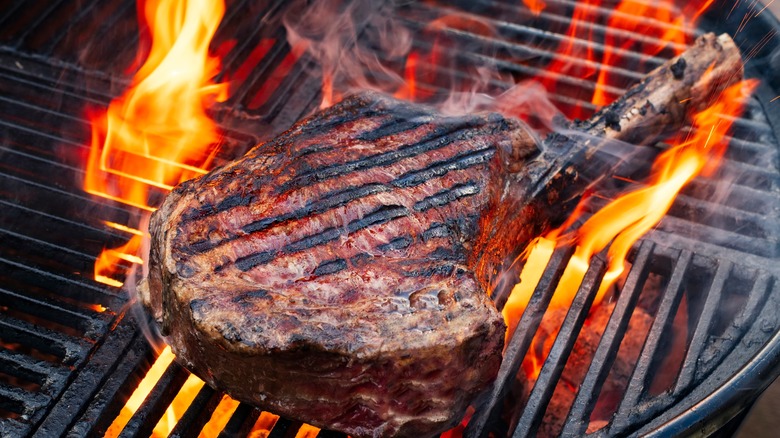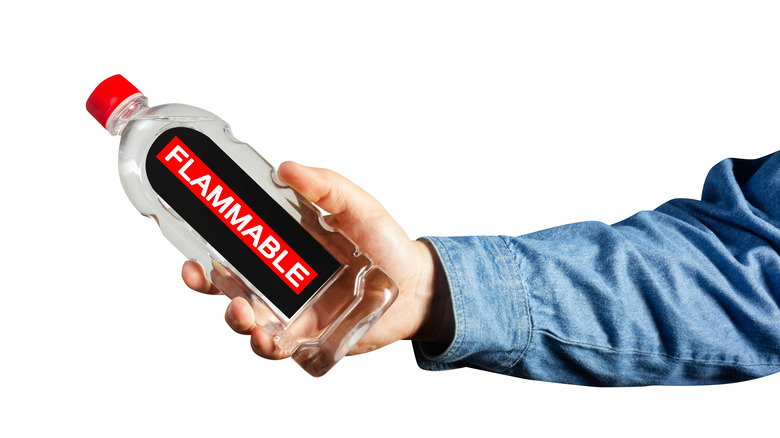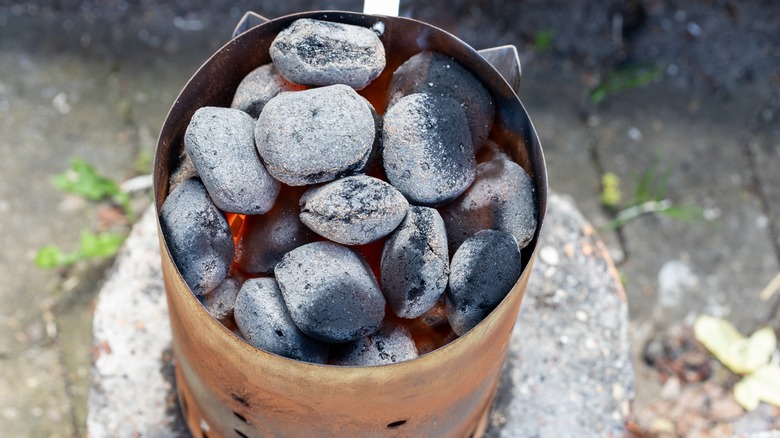Cooking Oil Is The Key To Starting Your Grill Without Lighter Fluid
While lighter fluid is often a staple at backyard barbecues, many grill masters — both professional and amateur — insist that relying on lighter fluid to start a grill imparts an unpleasant taste to the food. A bad-tasting result is particularly common when sufficient time isn't allowed for the lighter fluid to burn off from the coals before grilling food. In addition to flavor concerns, however, lighter fluid is extremely dangerous if accidentally ingested, and can have a negative impact on the environment. Despite the cautionary tales, lighter fluid continues to be a hot commodity. Just saying "no" to lighter fluid begs the question, however: How do you start a grill without it?
The answer lies in a common pantry staple found in just about every kitchen in America. Drizzling a paper towel with cooking oil is a simple, natural, and budget-friendly substitute for lighter fluid that will have those coals lit in no time. While plain vegetable oil is the most cost-effective ingredient to use (and is generally about half the cost per ounce of lighter fluid), any oil will work in a pinch. This method can be used in tandem with a chimney starter, but it also works when added directly to the bed of unlit charcoal. Simply nestle the paper towel in the charcoal, light, and watch as the fire spreads to the surrounding briquettes or lump pieces.
Lighter fluid versus cooking oil
The main reason that people reach for lighter fluid is — let's face it — that charcoal isn't going to light itself! While the advent of charcoal briquettes, lump charcoal, and fancy grills has made grilling more convenient than ever, it still requires getting the fire going first. One common misconception is that you need a ton of fire power (literally) to get the grill going, when in reality, lighting a charcoal grill requires applying enough heat to ignite the briquettes or lump charcoal, no matter the method. (However, some brands do burn faster and/or hotter than others.)
When using lighter fluid, the charcoal is doused with lighter fluid before igniting with a match or stem lighter. Swapping out a few paper towels drizzled with cooking oil may be less dramatic, but it gets the grill started just as quickly, avoids releasing volatile organic compounds (VOCs) into the air, and alleviates any issues with a residual chemical taste in your food.
The cooking oil method reigns supreme
While cooking oil is far superior to lighter fluid when it comes to starting a charcoal grill, it has advantages over other methods too. Newspaper was once the starter of choice for the anti-lighter fluid crowd, but newspaper can sometimes create a lot of unnecessary ash, and often requires a lot of paper to get the coals well lit. (Also, how many people have a stash of newspaper lying around in the digital age?)
Some cooks prefer to use an electric starter, but these devices require a nearby electric outlet, rendering them useless in some grilling set ups. Paraffin-coated starter cubes also work well, but they are a specialty item that requires restocking when you run out. Regardless of how you get that grill started, be sure to let the charcoal turn an ashy gray color before adding any food to the grill to ensure an even, ideal cooking temperature.



